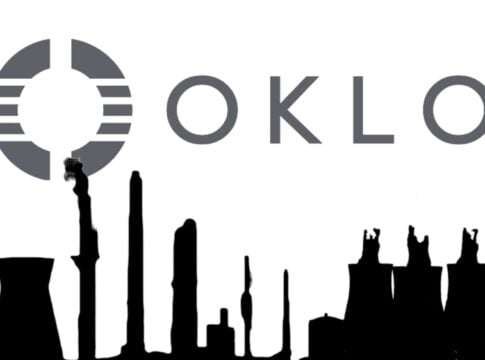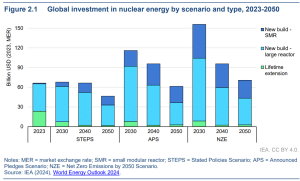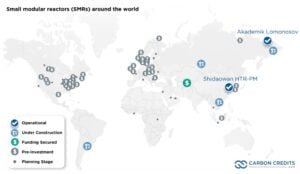The U.S. Air Force chose Oklo Inc., a nuclear energy startup based in California, as the preferred contractor to build a microreactor at its Eielson Base in Alaska. This step shows increasing military confidence in nuclear microreactor technology. It can provide off-grid power and heat in tough environments.
Oklo Nuclear: Powering the Future with Microreactors
Founded in 2013 by MIT engineers Jacob DeWitte and Caroline Cochran, Oklo develops small, advanced nuclear reactors. These reactors aim to provide clean and reliable energy.
These “Aurora” microreactors are smaller than regular nuclear power plants. They produce around 15 to 50 megawatts of electricity. That’s enough to power a small town, a military base, or a large industrial facility.
What makes the Aurora design unique is its ability to use recycled nuclear waste as fuel and run for up to 10 years without refueling. It also uses a fast-neutron spectrum and liquid metal cooling, allowing for a safer, more efficient design.
If the reactor overheats, the system slows the reaction. This removes the need for complex backup systems. Oklo aims to sell energy through long-term contracts, where it owns, operates, and maintains the reactor for the customer. This business model makes Oklo more like an energy service provider than a traditional reactor builder.
Steps Forward and Setbacks
In early 2025, Oklo finished drilling and site evaluations, which are necessary before construction starts. They must follow these steps before submitting a new licensing application to the U.S. Nuclear Regulatory Commission (NRC).
Oklo submitted a combined license application to the NRC in 2020. However, it was rejected in 2022 because it lacked important technical information.
Despite the setback, the company has been working closely with regulators and plans to reapply later in 2025. If the NRC approves the application, Oklo could begin construction and possibly start generating power by 2027.
The company’s recent progress has also sparked interest from investors. After announcing the site preparation in Idaho, Oklo’s stock rose significantly. In 2025, its share price increased by more than 50% year-to-date and nearly 190% over the past 12 months.

The market seems to be responding to the company’s momentum and its potential role in the next wave of clean energy innovation.
Alaskan Pilot with the Air Force: A Cold Test for Hot Tech
The recent deal with the US Department of Defense is a major event for Oklo. The DoD selected the company for a long-term power purchase agreement.
The agreement, still in the planning stage, involves building an Aurora microreactor at Eielson Air Force Base in Alaska. The base is about 26 miles southeast of Fairbanks. It is remote and hard to power using traditional methods.
Under the plan, Oklo will design, build, own, and operate the microreactor on-site. The reactor is expected to provide up to 75 megawatts of electric and thermal energy to the base. This energy setup lets the base run on its own. It also cuts down on the need for costly fuel deliveries, which can be tough during harsh Alaskan winters.
While the Notice of Intent from the U.S. Air Force shows a strong commitment to working with Oklo, the project is not yet finalized. It still needs NRC licensing approval, final contract negotiations, and further planning.
This is not the first time Eielson AFB has been involved in a microreactor plan. In 2023, a similar deal was canceled. This happened because of delays in regulatory permits and unclear timelines. This time, Oklo hopes its improved design and updated application will clear those hurdles.
If everything goes according to plan, Oklo could begin delivering power to Eielson as early as 2028. The project supports the Department of Defense’s goal. It aims to enhance energy security at military sites.
Also, it seeks to lower carbon emissions by using small, local clean energy sources. The US military is pursuing similar goal of powering its bases with nuclear.
Small Reactors, Big Future: Beyond the Arctic Circle
Oklo’s work is part of a larger movement toward small modular reactors (SMRs) and microreactors that aim to provide carbon-free power in places where wind and solar are not reliable. These advanced nuclear technologies are gaining attention not only from the military but also from tech companies and industrial users.
In 2025, big data center operators and cloud providers like Amazon, Google, and Switch showed interest in teaming up with nuclear companies. They want to secure long-term power for their operations.
Oklo is looking beyond Alaska. It plans to develop other projects in Idaho and Ohio, targeting a range of customers from local governments to private companies. The company’s approach—combining long-term contracts with on-site operation—could offer a flexible solution to growing global energy needs.
However, there are still some concerns. One issue is nuclear proliferation. Aurora reactors use high-assay low-enriched uranium (HALEU). This type has more uranium-235 than regular nuclear fuel.
In some cases, the design may involve plutonium-based fuels from recycled waste. Critics worry that these materials, if not properly secured, could be diverted for use in weapons.
In response, Oklo claims its design traps plutonium in radioactive waste. This makes it hard and risky to extract for other uses.
Oklo’s Nuclear Peers: Who Else Is Powering Up?
Alongside Oklo, several companies are advancing nuclear energy through SMRs and microreactors.
NuScale Power, based in Oregon, is a public company whose VOYGR‑6 SMR design (462 MWe) was approved in May 2025, building on its earlier VOYGR‑4 certification in 2023. It leads the SMR field with NRC design approval and a growing project pipeline.
TerraPower, backed by Bill Gates, is developing the Natrium reactor—a 345 MWe sodium‑cooled system paired with 1 GWh molten salt energy storage. Construction began in 2024, with commercial operation targeted by 2030.
Kairos Power focuses on fluoride‑salt high‑temperature reactors. It received NRC approval for its Hermes demonstration reactor in Tennessee and has a deal with Google to supply AI data centers by 2030.
Oklo’s Aurora microreactor represents a bold step forward in the future of clean, decentralized energy. Backed by the U.S. Air Force and rising investor trust, the company shows that small nuclear can significantly power remote sites, military bases, and tech infrastructure. While challenges remain, Oklo’s progress signals that microreactors may soon become a practical solution to both energy security and climate goals.
The post Oklo Stock Soars After U.S. Air Force Nuclear Energy Deal appeared first on Carbon Credits.

















